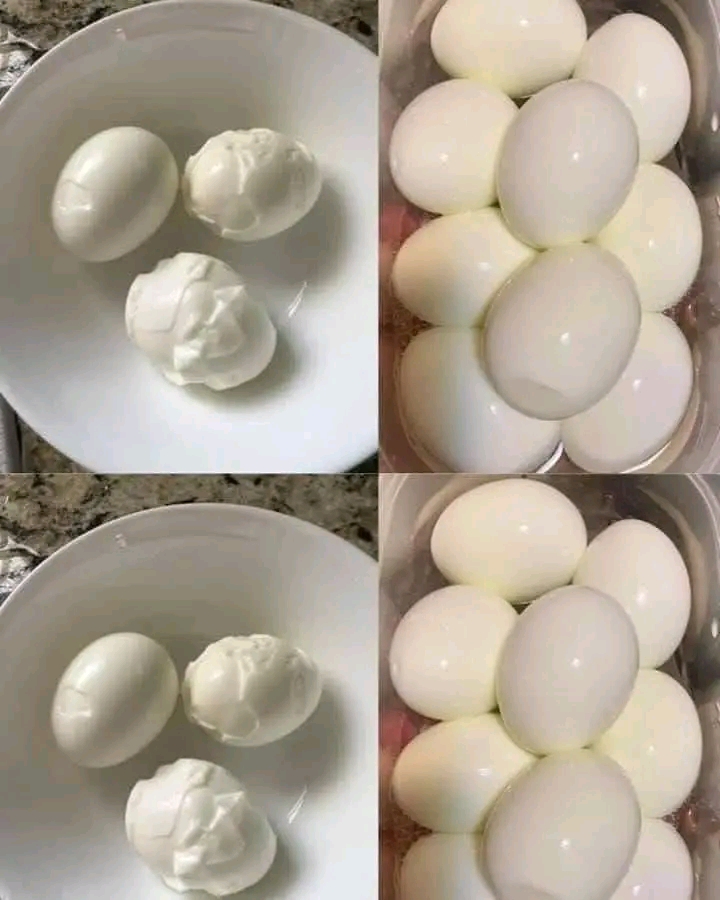Here’s a complete recipe and cooking profile for Perfectly Peeled Hard-Boiled Eggs, written in the format you like:
Introduction
Hard-boiled eggs are one of the simplest yet most versatile foods, enjoyed worldwide as a quick snack, breakfast staple, salad topping, or protein boost. However, one common frustration is peeling them—sometimes the shells cling stubbornly, leaving behind torn, uneven eggs. Thanks to the wisdom of culinary masters like Jacques Pépin, there are proven techniques to achieve perfectly peeled, smooth eggs every time. This guide helps you master the art of flawless hard-boiled eggs, making them as beautiful as they are delicious.
Origin and Cultural Significance
Eggs have been a vital food source since ancient times, symbolizing fertility, rebirth, and nourishment across many cultures. In cuisines worldwide, hard-boiled eggs play essential roles: they are dyed and decorated for Easter in Europe, used in deviled eggs in the United States, served in salads and noodle soups in Asia, and featured in Middle Eastern dishes like ful medames. Mastering the perfect hard-boiled egg is not only a cooking skill but also a culinary tradition that bridges cultures and family tables.
Ingredients Quantity
- 6 large eggs (or as many as desired)
- Water (enough to cover eggs by 1–2 inches)
- 1 teaspoon salt (optional, helps prevent cracking)
- 1 teaspoon baking soda or vinegar (optional, eases peeling)
Optional Additions
- Ice cubes for a quicker ice bath.
- Fresh herbs or spices (like bay leaves or peppercorns) added to the boiling water for subtle aroma.
- A tiny pinhole punctured at the wide end of the egg before boiling (Jacques Pépin’s trick).
Tips for Success
- Use slightly older eggs—they peel more easily than very fresh ones.
- Shock the eggs immediately in ice-cold water after boiling to stop cooking and loosen shells.
- Roll eggs gently on a flat surface to crack shells evenly before peeling.
- Peel under running water to help remove stubborn bits of shell.
- Don’t overcook—over-boiled eggs develop a greenish ring around the yolk.
Instructions
- Place eggs in a saucepan and cover with cold water by about 1–2 inches.
- Add salt and a little vinegar or baking soda if desired.
- Bring water to a gentle boil over medium-high heat.
- Once boiling, reduce heat slightly and cook for:
- 9–10 minutes for firm yolks
- 7–8 minutes for medium yolks
- 6 minutes for slightly soft yolks
- Immediately transfer eggs to a large bowl of ice water. Let sit for at least 10 minutes.
- Gently tap eggs on a hard surface, roll to crack the shell, and peel under running water for smooth results.
Description
Perfectly peeled hard-boiled eggs are smooth, flawless, and tender. The whites are firm yet delicate, while the yolks are creamy and golden without being chalky. Unlike eggs with broken or stubborn shells, these beauties are ideal for deviled eggs, salads, or simply enjoyed with a sprinkle of salt and pepper.
Nutritional Information (per 1 large egg)
- Calories: 70
- Protein: 6 g
- Fat: 5 g
- Saturated Fat: 1.5 g
- Cholesterol: 185 mg
- Carbohydrates: 0 g
- Fiber: 0 g
- Sodium: 65 mg
Conclusion
Hard-boiled eggs are proof that the simplest foods can be the trickiest to perfect. By using techniques like ice baths, slight additions to the boiling water, and Jacques Pépin’s clever pinhole trick, you can say goodbye to ragged eggs and enjoy beautifully smooth ones every time.
Recommendation
Serve hard-boiled eggs as a protein-packed snack, slice them over avocado toast, dice into potato salad, or prepare classic deviled eggs for gatherings. They also make an excellent topping for ramen, grain bowls, or Mediterranean platters.
Embracing Healthful Indulgence
Eggs are nutrient-dense, affordable, and versatile. They provide high-quality protein, healthy fats, and essential vitamins like B12 and D. Embracing them as part of your daily diet means you’re choosing a food that fuels your body while keeping preparation simple. By learning how to boil and peel them perfectly, you elevate a humble kitchen staple into a reliable, healthful indulgence.
Would you like me to also include different boiling methods (like steaming or air-fryer hard-boiled eggs) so you have options beyond the classic stovetop version?

